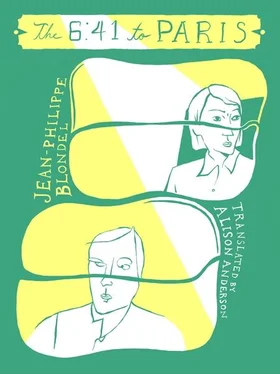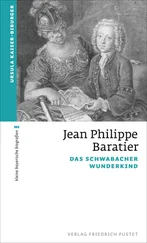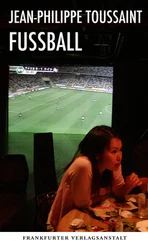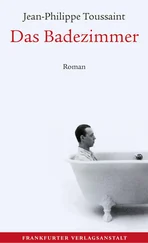Was Philippe Leduc worth it?
At the age of twenty, perhaps he was.
It’s a difficult age, twenty, for a man. They’re so eager to dominate. To mark their territory. There’s a sort of nervous abruptness. Awkwardness. That rebellious side, inspiring tenderness but unbearable at the same time.
It’s a difficult age, but that’s no excuse.
In any case, it’s no excuse for London.
I’m feeling a sudden surge of rage.
So I really haven’t gotten over it.
On the 6:41 train, in the toilet, looking in the mirror, I remember the journey home.
By the time I walked out of the station, all alone, I was seething. Sitting in the sidewalk café across the street was Mathieu. Philippe Leduc’s best friend. A mere coincidence. We had met a few times. Now we exchanged hesitant greetings. He frowned. He asked me where I had been. London. With Philippe? I waved my hand as if to say, “It’s not important.” He asked me if I wanted a coffee. I almost said no, because it wasn’t a good time, I had other fish to fry, I had some wild horses inside me that wanted setting free, but I shrugged and said “Why not?” I toyed with the idea of seducing Mathieu. It gave me pleasure. I didn’t go any further, because I wasn’t that sort of girl. Nowadays I wouldn’t hesitate.
Mathieu.
Mathieu Coché.
I would never even have remembered his name if I hadn’t come across an article in a magazine at the hairdresser’s. A fairly long interview. A rising star, describing his childhood. His adolescence. His roots. His passion for the theater. How he moved to Paris, and all the opportunities there. It was mush. Sickly sweet. A cream pie of the sort you like to lap up while you’re waiting for the hairdresser to finish painting your hair with dye.
I looked at the photograph, and I didn’t recognize the young man I had known. Back in those days Mathieu Coché was not particularly popular or even attractive. He seemed gauche. A bit of a lump is how my grandmother would have put it. Burdened with a frame that was shooting up, but that, for the time being, was too well-filled. He often looked downcast. He had an identity only by virtue of association. He was “Philippe Leduc’s friend”. He was just a stand-in, and girls showed any interest in him only because of his closeness to the boy they really coveted.
What a magnificent role reversal.
I didn’t really follow Mathieu’s career; I kept up with the programs on television, but I don’t think I ever saw a single film or series he played in. The insipid nature of the article annoyed me. I was just about to put the magazine down when I noticed the mole he had just above his wrist. I don’t know why, but it affected me. I smiled. I smiled at the man in the photograph. That day, too, at the hairdresser’s, I remembered the sidewalk café opposite the train station.
We didn’t really know what to talk about. Mathieu Coché wasn’t very chatty. I was really surprised, too, when I found out he’d become an actor. The way I saw it, actors had to be extroverts, had to feel easy around people. Performers who were well-integrated and experienced in giving interviews.
I was seething with hatred that day. With no end in sight. It had overwhelmed me on the return journey. I had emerged from the sort of hazy state I’d been in most of the night. I was only vaguely aware of getting off the train in Dover, showing my passport, and boarding another train. But suddenly in Paris, when I left the Gare du Nord, there was a wolfhound in my body. If Leduc had been there in front of me, I would have torn him to shreds.
I felt just the same — nothing had changed — when I got off the train in Troyes. Then suddenly there was Mathieu Coché. The guy’s best friend. It was too much. But at the same time I knew I had no reason to blame Mathieu. Besides, he was being considerate. He asked me, awkwardly, had it not gone well. I just said, “You don’t want to know,” and he nodded. He let a few minutes go by. The waiters were bustling around us. With their black and gold striped waistcoats, they looked like wasps.
I saw wasps. All around me. Their mandibles slicing up pieces of my flesh with a precise cruelty. My arms. My cheeks. My tongue. My eyes.
I had a sudden abrupt reaction, and almost knocked over the table. Mathieu Coché was startled. He touched my hand.
“What’s wrong?”
“Nothing. I thought there was an insect.”
“If you want to talk, or have a drink, or simply see someone, you can call me. I’ll be here all summer.”
I didn’t say anything. I just stared at him. What was he thinking, really? Was he trying to hit on me? Was this his thing, to console the ex-girlfriends of his pal the heartbreaker? Or was it nothing? Simply nothing? Politeness? Kindness in the presence of someone who’s in pain? I never found out. I never called him, either.
He raised his hand to ask for the check, and the watch he was wearing slipped an inch or so down his arm. That’s when I saw the mole, just above his wrist.
All of a sudden, I emerged from my hatred.
I caught a glimpse of what was hidden deep inside Mathieu Coché.
His eyes, shoulders, forearms, neck — everything was seeping with absence. With emptiness.
The possibility, suddenly, of another life, with Mathieu Coché, was dizzying. Even today, it still is. Even here, now, on this early-morning train. Even here in these SNCF toilets that could use a good cleaning.
Someone just tried the handle. Once. Twice.
I don’t know how long I’ve been in here.
I’m out of my mind.
I have to get out of here. And back to my seat. The trip is already half over. It will go quickly now. Everything goes so fast anyway. Everything goes so fast, but twenty-seven years later, it is all still there.
“Excuse me.”
“No problem.”
She brushed past me.
Just the slightest contact, that brushing motion, bringing back impressions, colors, dark green, deep blue, undergrowth. Did I ever go walking in the forest with Cécile? If I did, I don’t remember. And yet there’s a lot I do remember. Some things that I would rather forget. The way I behaved toward her at the end. I would like to tell her that I never did anything like that ever again. It’s true. Before her, yes. I could be a real lout. A cad. All those words no one uses much anymore.
I was almost back there.
If I closed my eyes, with her legs brushing against mine, I could remember how it was, the two of us. The way we moved together. The way we talked. All that blustering. How we wanted to make fun of everything. To be supremely ironic. Such vanity. What poseurs we were.
My cell phone vibrating.
Text message from Christine: “We have to talk.” Which just goes to show how useful cell phones are: to send a message to tell the other person that you have to talk. Now, indeed, the time has come to be sarcastic. But sarcasm all on one’s own is pointless. And this woman next to me on the train is not about to speak to me. I wonder if she’s recognized me. I’ll bet she has, now: but that’s pure vanity. As if I were so unforgettable. And my looks hadn’t changed a bit. That’s what I used to think. That as you got older your body just got drier — you got wrinkles, more accentuated features, and that was it. Whereas nowadays I look like a balloon. Full of hot air, wedged tight into an uncomfortable SNCF seat.
What am I supposed to say to Christine? What can I possibly reply? “Whenever you want,” “Yes,” “No,” “Now what,” “I miss you.”
Or something neutral and descriptive. “I’m on the train.” Then, for a bit of spice, provoke her: “With Cécile Duffaut.” But that wouldn’t serve any purpose — Christine doesn’t know Cécile.
Читать дальше












